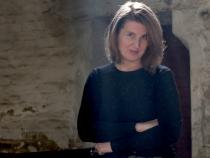to catch a running poet
Maja Mijatović (Cembalo)
MÖGE DIE ÜBUNG GELINGEN
Petra Stump-Linshalm
dringen
Peter Jakober
Ištaratu
Margareta Ferek-Petrić
empty-forms
Rafael Nassif
arresting images
Hannes Dufek
Video: Enes Zlatar und Ajna Zlatar
With the harpsichord, one does not immediately think of premieres. The Vienna-based harpsichordist Maja Mijatović, however, recently invited several composers whose work she particularly appreciates to write for her instrument. Then, in 2019, she released a surprising and diverse album with a series of first recordings for the harpsichord that was ranked among the best albums by the Preis der Deutschen Schallplattenkritik (German Record Critics’ Award).
At musikprotokoll 2020, Maja Mijatović shows how thrillingly and differently contemporary composers deal with the sonic cosmos of the harpsichord, how they experiment with it and reveal very subtle, hitherto concealed nuances of the instrument, but also how they savor the mechanical vitality of its sound. An “experimental arrangement for leaps in time” is what Hannes Dufek, one of the composers involved, calls this practice in which an old instrument is paired with contemporary music.
Maja Mijatović studied harpsichord with Wolfgang Glüxam in Vienna and is also a professionally trained flutist. The musical language of the contemporary avant-garde and the broad repertoire of Early Music comprise the two main foci for her artistic work. This indwelling polarity of such different, contrasting, and yet related forms of expression proves to be a constant source of exciting dialogue and discovery. Her willingness to research new sounds and playing techniques for the harpsichord as well as her dedication and uncompromising striving for musical expression constitute the driving force for her close collaborations with living composers, which have resulted in many new works from soli to concerti. Maja Mijatović is a co-founder of Ensemble Klingekunst. Her solo CD to catch a running poet was best-listed for the German Record Critics' Award 2019.
Peter Jakober (*1977) studied composition under Georg Friedrich Haas and Gerd Kühr at the University of Music and Performing Arts Graz. So far his works have been interpreted by the ensemble recherche, the Aleph Guitar Quartet, Klangforum Wien, the Arditti Quartet, Cologne‘s thürmchen ensemble, the Ensemble für Neue Musik Graz and the Graz Orgelpfeifenorchester. There have been collaborations with the choreographer and director Paul Wenninger and the ensemble]h[iatus from France. He received the Andrzej Dobrowolski Composition Scholarship from the province of Styria in 2010, the SKE Publicity Prize, the Scholarship of the Akademie Schloss Solitude 2011/12, and the Erste Bank Composition Prize 2015. After stays abroad in Rotterdam and Cologne Jakober currently lives in Vienna.
Margareta Ferek-Petrić’s (*1982, Zagreb) music can be described as colourful, humorous, deep and strives to create absurd sound-images. Her approach implies an ironic treatment of traditional musical aesthetics, implanting vivid rhythmical impulses, transforming theatrical gestures into timbre and exploring the intensity of extended instrumental techniques. The inspiration for her scores comes from literature, art, movies, science, politics, philosophy, remarkable individuals or bizarre life situations. In addition to being a composer, she will serve as artistic director for the next editions of the Music Biennale Zagreb.
Rafeal Nassif (*1984, Brasilia) is a composer and pianist and curates and organises concerts. He studied composition and took private lessons in Alexander Technique and musical phenomenology. In 2015 he moved to Graz where he works as a freelance composer and teaches composition, piano and Tibetan yoga. He has received various composition awards and commissions, for instance a grant from the Arts Foundation Baden-Württemberg (2014), the Berlin Art Prize for Music from the Academy of Arts, and a composition grant from the Austrian Chancellery (2017). He organises private concerts of contemporary music and is a member of the composer’s association “die andere saite”. Nassif has been exploring microtonality since 2005. His most recent pieces are strongly characterised by spoken voices, instrumental multiphonics and just intonation.
Hannes Dufek was born in 1984 in Vienna and is a composer and musician. His oeuvre encompasses concert pieces, intermedial works, graphic scores and music for stage productions. An essential point of interest is hereby the registering and opening up of free spaces, an understanding of music as an agent of perception of the world under the sign of freedom. He is father of a son and lives in Vienna.
